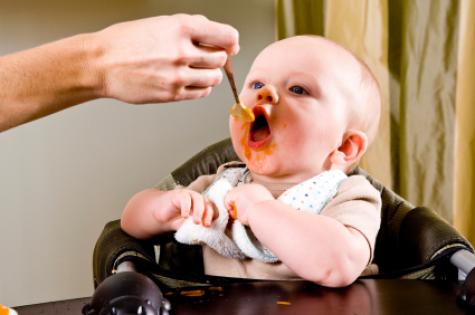Introducing your baby to solids can be daunting and confusing (not to mention messy).
We asked an accredited practising dietitian, Stephanie Herd, to give some pointers on doing so.
What’s the ideal time to introduce solids?
Stephanie: Always check with your GP or paediatrician, but typically babies are developmentally ready to start between the ages of 4 and 6 months. It’s important not to rush it. I suggest waiting until your baby is close to 6 months old before introducing solids. This gives your baby's digestive track more time to mature, may help reduce the risk of allergies, and may decrease the risk of obesity later in life.
Why does a baby need solids?
Steph: Around 6 months of age, your baby starts to need iron and other nutrients available from solid food. Until then, babies can use iron stored in their bodies from the womb, as well as from breast milk and formula but this isn’t enough for them from this age. They’re also ready to experience new tastes and textures, and it helps them to develop their teeth and jaws.
How do you know when your baby is ready?
Steph: Some of the clues your baby might give include:
- showing an interest in food including what’s on your plate
- putting their fingers in their mouths
- an increased appetite
- opening their mouth when food is offered on a spoon
- good head and neck control and the ability to sit upright when supported in a highchair.
If you give solids to babies too soon, they might get tummy upsets or develop food allergies.
Is cereal definitely the first solid that should be introduced?
Steph: No, it's not the only option for a first food. Other choices include pureed sweet potatoes, bananas, avocados, squash, lentils, or green vegetables. Iron-fortified infant rice cereal has always been a common first food because it is gluten-free, easy to digest, and less likely to cause allergies. But this doesn’t mean that rice cereal is the best first food option.
So how do we choose that first solid?
Steph: Start with a single food – infant rice cereal is a very good option. Start with a teaspoon, just once a day, generally after they’ve had some breast milk or formula. Increase the amount by a teaspoon each day until your baby is eating a maximum of two tablespoons. Once they are eating two tablespoons, you can offer solid food twice day, and you can thicken this slightly as your baby eats more.
What problems do babies have?
Steph: Most babies don’t have any problems with solid foods, but watch for signs of intolerance or allergic reactions such as vomiting, diarrhoea or rashes. The best way to do this is introduce different foods every few days but only use one food at a time until you find out if your baby likes it – but even if they don’t, do try it again another time.
What are some of the grains we can try and what are the differences among them?
Steph: Quinoa has complete protein and is packed with fibre and a variety of vitamins and minerals including calcium, iron, and folate. Oats are an excellent source of fibre, calcium, and protein and provide both iron and zinc. Barley is a good source of vitamin A, folate, and protein.
What about rice?
Steph: While it’s easy to digest, white rice is low in nutritional value, does not have a lot of flavour, and does not mix well into a smooth consistency. It ends up a bit clumpy.
Any specific recommendations?
Steph: I would definitely start with infant rice cereal. It’s bland, which is good for baby’s first taste, and full of iron. Another option is potato. You can mix either of these with water, breast milk or formula which helps your baby think the taste is vaguely familiar.
What about the mess?
Steph: The eating process will be messy and slow. Eating is a skill that babies have to learn, including how to get food to their mouths. Your baby might also want to touch and test the texture of new foods. If you’re house proud, now is the time you are going to have to learn to stay calm and patient! It will also help your baby relax if you are too. The best thing is to spread newspaper or plastic under the highchair, as it makes cleaning up easier, and have a cloth within reach. You should try to have at least one meal a day together as a family, as this gets your baby used to the idea of socialising together over a meal and they will learn manners from seeing how you behave.



















__small.png)










